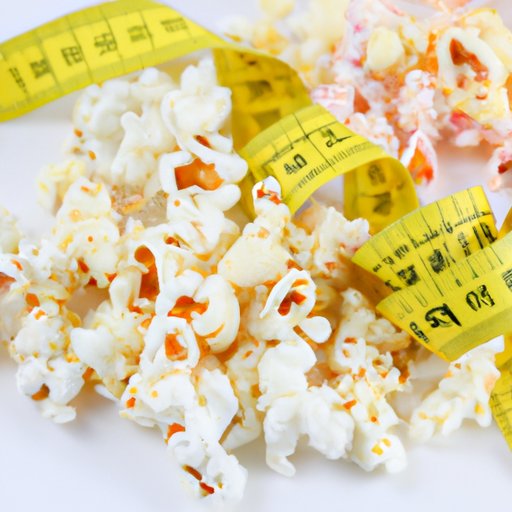
Introduction
Popcorn and weight loss may seem like an unlikely pairing, but the truth is that popcorn can be a great snack for those looking to lose weight and improve their overall health. In this article, we’ll explore the surprising benefits of popcorn and how it can fit into a healthy diet. We’ll cover everything from its nutritional value to tips on how to enjoy it without derailing your diet.
The Surprising Truth About Popcorn and Weight Loss
It may seem counterintuitive that a snack food could actually help with weight loss, but popcorn is an exception. One of the key reasons for this is that popcorn is a low-calorie, high-fiber food. In fact, air-popped popcorn can have as little as 30 calories per cup! This means that you can eat a relatively large serving of popcorn without consuming too many calories.
Studies have also shown that eating popcorn can help you feel full and satisfied, which can prevent overeating. Plus, the fiber in popcorn can help regulate your digestive system and keep you feeling fuller for longer periods of time.
Popcorn: The Perfect Snack for Your Healthy Diet
Popcorn isn’t just a low-calorie snack – it’s also packed with nutrients that can benefit your body. Popcorn is a great source of fiber, which can help improve digestion and regulate blood sugar levels. It also contains protein, B vitamins, and antioxidants that can support overall health. And because popcorn is naturally gluten-free and whole grain, it’s a good choice for those with dietary restrictions or food sensitivities.
When compared to other popular snack foods, like chips or candy, popcorn comes out on top in terms of nutrition. While those other foods may be higher in fat, sugar, and calories, popcorn offers a satisfying crunch and flavor while still being relatively low in fat and calories.
Snack Smarter: How Popcorn Can Help You Stick to Your Diet Goals
One of the biggest challenges when it comes to dieting is managing cravings and hunger. That’s where popcorn can come in handy. Because of its high fiber content, popcorn can help curb hunger pangs and cravings. Plus, popcorn is a delicious and satisfying snack that can help prevent overeating later on.
However, it’s important to remember that not all popcorn is created equal. Some varieties, like those that are pre-packaged or microwaveable, can be high in sodium, fat, and preservatives. To snack smarter, opt for air-popped popcorn or microwaveable popcorn that is labeled as “light” or “low-fat.”
The Top 5 Reasons Why Popcorn is a Good Choice for a Healthy Diet
Still not convinced that popcorn is a snack worth adding to your diet? Consider these top five benefits:
- Popcorn is low in calories, making it a great choice for weight loss.
- Popcorn is high in fiber, which can help with digestion, blood sugar management, and feelings of fullness.
- Popcorn is packed with nutrients like protein, B vitamins, and antioxidants that can support overall health.
- Popcorn is a whole grain food, meaning it contains all parts of the grain and is an important source of complex carbohydrates.
- Popcorn can be a satisfying and delicious snack that helps prevent overeating and bingeing on less healthy foods.
Can Popcorn Be Part of a Weight Loss Plan? Here’s What Nutritionists Say
When it comes to weight loss, many people wonder if popcorn can be included in their diet plan. The answer is yes – as long as it’s consumed in moderation and as part of an overall healthy and balanced diet.
Nutrition experts agree that popcorn can be a great addition to a weight loss plan, as long as it’s not loaded with butter, salt, or other unhealthy toppings. Plain air-popped popcorn or popcorn that is lightly seasoned with herbs and spices is the best choice.
From Microwave to Air-Popped: Which Popcorn is Best for Your Diet?
When it comes to choosing the best type of popcorn for your diet, there are a few things to keep in mind. Air-popped popcorn is the healthiest option, as it contains no added oil or fat. Microwave popcorn can also be a good choice, as long as you select a healthy variety that is low in fat and sodium. Pre-popped popcorn that comes in a bag or container is often less healthy, as it may contain added oils, preservatives, and flavorings.
It’s important to read the nutrition labels carefully and choose the popcorn that is lowest in calories, fat, and sodium. And remember, portion control is key! Stick to a serving size of one to two cups of popcorn per snack.
How to Enjoy Popcorn Without Ruining Your Diet
While popcorn can be a healthy snack on its own, there are plenty of ways to make it even more satisfying and nutritious. Here are a few tips:
- Add seasoning instead of butter. Try sprinkling popcorn with herbs, spices, or nutritional yeast for added flavor.
- Pair popcorn with protein. Eating popcorn alongside a source of protein, like cheese or nuts, can help make it more satisfying and filling.
- Control your portions. Use measuring cups to ensure that you’re only eating one to two cups per snack.
- Avoid pre-packaged or flavored popcorn. These varieties can be high in sodium and artificial ingredients.
Conclusion
Popcorn is a snack food that often gets a bad rap, but the truth is that it can be a great addition to a healthy diet. With its low calorie count, high fiber content, and array of nutrients, popcorn is a satisfying and delicious option that can help with weight loss and overall health. By making smart choices about the type of popcorn you consume and how you enjoy it, you can incorporate this tasty snack into your diet without sacrificing your health goals.





